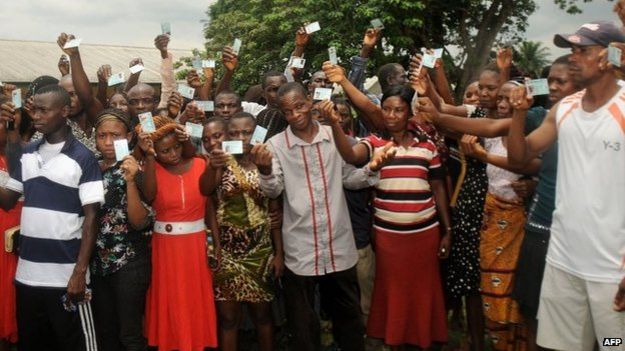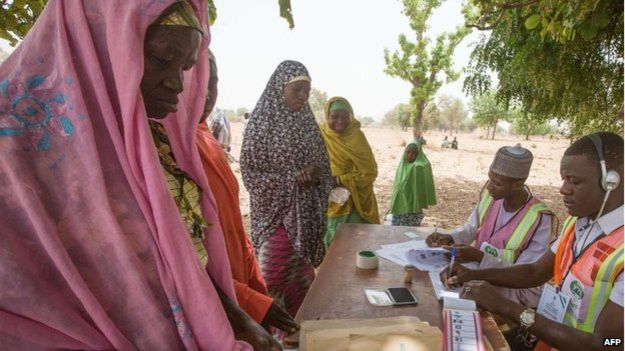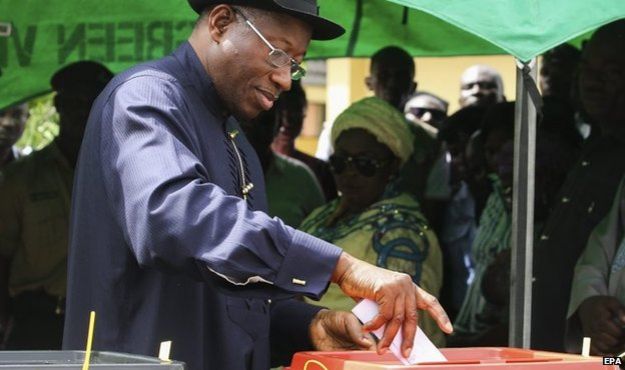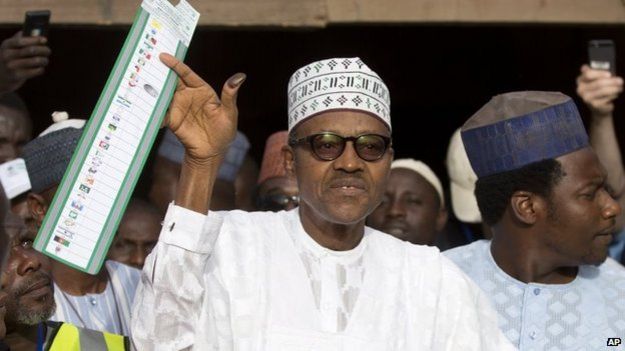
Elections in parts of Nigeria have been extended until Sunday after delays and a number of attacks.
The delays were "not widespread" but were still "a matter of concern", an election official told the BBC.Technical problems with new biometric cards slowed down voter registration, even affecting President Goodluck Jonathan.
More than 20 people have reportedly been killed in various attacks by unknown gunmen.
Mr Jonathan is facing a strong challenge from Muhammadu Buhari.
The election is said to be the most closely fought since independence
It was postponed from mid-February to allow the army time to recapture territory from the Islamist militants of Boko Haram.
The two main candidates had pledged to prevent violence during and in the aftermath of the elections.
But several hours after voting started, reports came in of violent incidents at polling stations in which at least 24 were reported to have been killed.

Thousands of Nigerians turned out to vote, despite threats from Boko Haram to disrupt the poll.
"We have suffered enough, fled our homes after many attacks," said Roda Umar, a housewife from the former militant headquarters of Gwoza. "I'm ready to endure the pain to vote."
'Slow progress'
Voters are also electing members of the house of representatives and the senate.According to the Transitional Monitoring Group (TMG), the largest body observing the elections, voting had started in 75% of polling stations, while 92% had the materials they need to start the process.
Voters need to register using biometric cards with their fingerprints before they can cast their vote.
However, there have been problems with the card readers at many polling stations.
The Independent National Electoral Commission (Inec) said the accreditation process had "gone on well in several places", but was "slow" or had "not commenced at all" in others.
President Jonathan tried for some 50 minutes to register in his home village of Otuoke, before coming back a second time. When the electronic registration failed again, he had to be accredited manually and did eventually cast his ballot paper.
Problems were also reported from the north's biggest city of Kano, where thousands of voters waited for election officials and voting materials to arrive.
"No-one has shown up from Inec... This is a deliberate attempt to sabotage the elections," Ismail Omar, a 65-year-old builder, told AFP news agency.
Gen Buhari did not have any problems registering in his hometown, Daura.
After voting, he told the BBC the process was "in order but I have been watching activities in other states, which is disappointing, but overall it's on course
- Two main presidential candidates:
Goodluck Jonathan, People's Democratic Party (PDP), Christian southerner, incumbent president, second-term bid
- Years of military rule ended in 1999 and the PDP has been in power ever since
- Nigeria is Africa's largest economy and leading oil producer
- With a population of more than 170m, it is also Africa's most populous nation
Nigeria decides 2015: Full coverage

Attacks were reported in north-eastern Gombe state, including incidents where gunmen opened fire on voters at polling stations.
It is unclear whether the attacks are the work of Boko Haram militants or political thugs.
However, Mr Jonathan told the BBC's Peter Okwoche that most of the violence in Gombe was not directly related to the elections.
"The war against terrorists is going on, voting or no voting," he said. "There was a conflict, kind of a crossfire, between soldiers and terrorists that had nothing to do with the elections."
Meanwhile, a soldier was killed in an ambush near the southern oil hub of Port Harcourt, the military says.
In other incidents:
- The Inec website was briefly hacked by a group calling itself the Nigeria Cyber Army, which warned the body not to rig the elections
- There was a controlled car bomb explosion at a polling station in Enugu state after the authorities discovered a car bomb
- According to the TMG, intimidation of election monitors at three polling stations in the south


Some 800 people were killed after the 2011 contest between Mr Jonathan and Gen Buhari, a former military ruler, who alleged fraud.
On Friday, the Nigerian army said it had retaken the town of Gwoza, believed to be the headquarters of Boko Haram, one of the last places still under its control
No comments:
Post a Comment